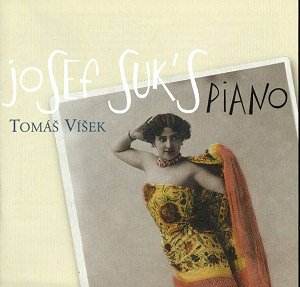Not
only is this an intriguing programme with some premiere recordings
but also it’s played on Suk’s own Bösendorfer. There’s even a
colour photograph of Tomáš Víšek playing it in Křečovice
surrounded as he is by Suk memorabilia. The works include his
well known Jaro or Spring but Arco Diva adds the much less played
opus 22 stable mate Letní dojmy (Summer Impressions). The Two
and Three Piano Pieces have never been recorded before and nor
has Spanish Capers. We also have four little morceaux by Dvořák’s
daughter and Suk’s short-lived wife, Otilie as well as four attractive
pieces by Suk’s son, also Josef. None of these have ever been
recorded.
The
disc starts with Spring and it’s rewarding to compare and contrast
Víšek with, say, Igor Ardašev on Supraphon. The latter
is all brightness and ease, making those dynamics really "bite",
playing with much more incisive chordal hardness. Víšek’s
Bösendorfer is softer, more rounded and it suits his interpretation,
which is rather more meditative and less inclined to extremes
in the opening movement. I should add though at this point that
the Bösendorfer has a very noisy action, which may grate
on the unsympathetic pernickety ear. What it also has is middle
register warmth and this really tells in the third piece, Anticipation.
Víšek is less inclined than Ardašev to stress rhythmic
disjunctiveness here and he maintains a more flowing and romanticised
approach. In the Andante views one again diverge, fruitfully so
for the listener; Víšek is almost daintily ambiguous whilst
his colleague finds a much darker and more sinuous text to mine.
Different approaches then cemented by the choice of instrument
(I don’t know what Ardašev was playing but it wasn’t a Bösendorfer).
Summer
Impressions never reaches these heights as compositions but it’s
still good to hear Víšek’s way with the delicate torpor
of Noon, the rhythmic joie de vivre of the Children’s Games (and
its real Czech Dance) as well as the remembrance of his great
early "hit" Písen lásky in Evening
Mood, complete with its quiet impressionistic gauze. Talking of
Písen lásky he plays it most attractively
and very expressively; is he fighting the bass a little and is
that why he seems too strong here - but that’s a mere quibble.
In
truth the disinterred Pieces for Piano (in two sets the first
from 1891, when Suk was 17; mind you he wrote Písen
lásky when he was 19) are rather salon material, little
Bagatelles or capriccios to play on his youthful travels. But
Spanish Capers shows another side to him with its offbeat displaced
accents and sly humour. Christmas Eve was written for a
Slovak textbook as a children’s song but, remaining unpublished,
Suk turned it into a piano piece. It’s solemn and affectionate
and very attractive. Of Otilie’s three little pieces – the only
works of hers that seem to have survived - it’s the Lullaby that
stands out, a lyrically charming piece, though the Humoresque
is capricious and eventful. Suk’s son, Josef, studied forestry
as a young man and was self-taught as musician and painter. Shortly
before his own sadly premature death he wrote these attractive
and unpretentious pieces. I’d draw attention to the fulsome Scherzino
and to the rather unusually wistful little Minuet.
The
production is very attractive indeed from the piano used to the
repertoire to the reprinting of a postcard letter from Suk himself
on the actual CD. I enjoyed it greatly and would judge this disc
a useful adjunct for Suk admirers and for devotees quite considerably
more.
Jonathan
Woolf
The
Arcodiva catalogue is now offered by MusicWeb

![]() for
details
for
details